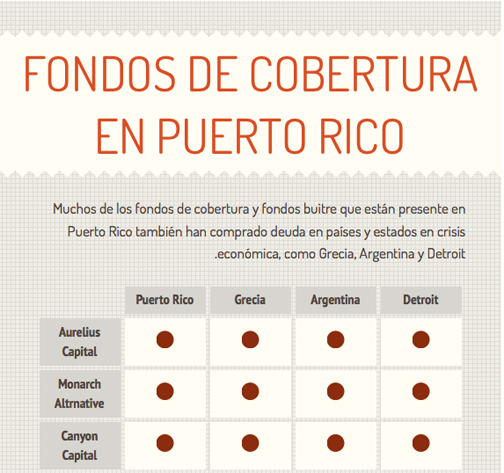CPI sues gov’t over refusal to disclose hedge fund info

The Center for Investigative Journalism filed a civil suit Monday against the government over its refusal to provide the names of the hedge funds that are getting ready to renegotiate or demand complete payment of Puerto Rico’s public debt.
The lawsuit filed in San Juan Superior Court names Gov. Alejandro García-Padilla and Government Development Bank President Melba Acosta as defendants and asks the court to order them to turn over documents and information about the hedge funds, the amount of bonds they hold, the names of the investors who make up the so-called Ad Hoc group negotiating with the government, as well as certain other documents.
In the nine-page document, the CPI, as the nonprofit is known by its initials in Spanish, details how it has spent the last four months unsuccessfully requesting information from the government, including lawmakers, about the identity of the groups behind Puerto Rico’s $73 billion debt.
“For the last four months, the CPI has requested that information from La Fortaleza, the GDB, the Office of Resident Commissioner Pedro Pierluisi, Sen. Ramón Luis Nieves and Anthony Princi, speaker for the Ad Hoc Group. The result: run-arounds and silence,” said CPI reporters Joel Cintrón and Carla Minet, in a joint article released simultaneously with the filing of the lawsuit.
“They also keep secret the documents that state the proposals or conditions established by the bondholders to collect or lend more money to the government,” the reporters said.
The CPI said the information requested is of “high public interest” because the investment firms that are “interested in collecting their debt are trying to influence economic and political decisions to secure their gains, which would entail that essential services for the citizens of the island could be affected by the lack of liquidity of the government.”
“Press reports are really the sole source of decent data on hedge fund involvement in Puerto Rico, sadly. Hedge funds don’t have to disclose bond buys, either in the primary market [a new government issuance] or in a secondary market sale [when one investor sells to another], the CPI quoted CPI Kevin Cooner, broker of LittleSis, a portal with a database about persons with interest in business and the government, as saying.
“So you basically have to rely on reporters seeing documents, hearing things, etc. Not a great situation, and certainly a transparency issue,” he told the CPI.
The lack of information on hedge funds is due to in part because the Securities and Exchange Commission, the federal agency that regulates securities, exempts them from revealing certain details that it requires from other traditional investment funds.
Short-term memory
In its analysis, the CPI said representatives from stateside hedge funds have been visiting lawmakers, including Nieves, who said although he met with them, he allegedly did not remember their names or the companies they represent.
“I will confess that, if you ask me now, there have been so many, so many, and so many with whom I have met, that I cannot give you a name here or a name there. We know that there is a group called the Ad Hoc Committee of Puerto Rico,” he said.
“But you are asking me for companies and I don’t even know their names, because there have been so many meetings,” the lawmaker told the CPI. “They started visiting me and that is not strange. These are people that have some interests in Puerto Rico and want to know how policy makers in the different areas of government think and their opinions. They need this information to make investment decisions and that is not illegal or immoral or anything.”
“I have met with hedge funds that are interested in the Puerto Rico Electric Power Authority, with hedge funds with interest in the GO’s. Since many of these companies usually have many resources and have dynamics used in the world with hedge funds, which they purchase at quite low prices in their dealings and then try to push to obtain the highest yield from their investment based on set interests and conditions,” the lawmaker further told the CPI.
The CPI said Acosta also held back from disclosing the names of the hedge funds on six occasions.
“The GDB does not have that information, you need to remember that when the debt is issued initially, the GDB knows who buys that debt but it continues to be re-sold and the ones who have that information are the brokers and the ones who keep re-selling it. I am sure that there is a way to find out,” she told the CPI.
As part of its research, the CPI put together a list of 36 hedge funds that allegedly hold Puerto Rico debt, many of which have also picked up debt in other distressed markets, such as Greece, Argentina and Detroit.














